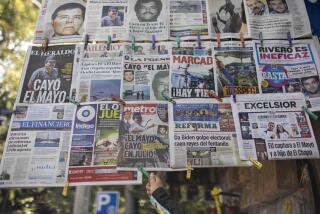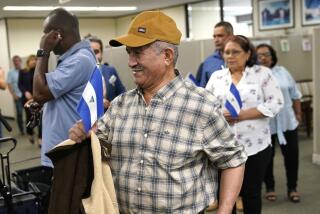Coup Leaders Gave Noriega 2 Options : Panama: Sources close to the rebel officers say there was no disagreement on what to do with him.
- Share via
MIAMI — The leaders of last week’s abortive coup in Panama gave Gen. Manuel A. Noriega a choice of retiring and going into exile in Panama or being turned over for extradition to the United States on drug charges, sources close to the uprising said Thursday.
“There was no disagreement between the officers over what to do with Noriega,” one source said. “They were clear on what they planned to do. They wanted Noriega to step down and accept exile. But they were agreed that they would turn him over to the Americans if he refused their ultimatum.”
The source, a Panamanian military officer who spoke only on condition of anonymity, said he believes the understanding was conveyed to U.S. officials at a clandestine meeting in the town of La Boca, near the Panama Canal, two days before the Oct. 3 coup attempt.
Earlier accounts of the coup indicated that its leaders were paralyzed during the crucial hours in which they held Noriega over whether to allow him to remain in Panama or turn him over to U.S. officials for extradition.
The new account portrays the coup leaders as united in presenting the Panamanian strongman with a clear choice, contradicting suggestions that indecision on the part of the organizers prevented U.S. officials from playing a more active role in the uprising.
Adela Bonilla de Giroldi, widow of Maj. Moises Giroldi Vega, leader of the coup, told reporters Thursday that she arranged the meeting in La Baca between her husband and three U.S. officials with the help of an American woman who had contacts at Ft. Clayton, a U.S. Army base adjacent to the Panama Canal.
Giroldi said that the friend, whom she declined to identify, arranged for the Giroldis to come to a private house in La Boca, where they were met by a U.S. colonel and two men in civilian clothes, on the evening of Sunday, Oct. 1.
“My husband and the other men went into a room, and when they came out my husband told me that everything was arranged, that everything would come out all right,” Giroldi said.
She added that while her husband had refused to go into details of what was discussed, he “seemed confident after the meeting and kept saying that everything was fixed.”
The Panamanian military source said that the meeting lasted about 20 minutes. After it ended, Maj. Giroldi told Capt. Javier Licona, his second-in-command, that the two men in civilian dress were from the CIA, the source said.
“They gave Giroldi a special telephone number to call in case he needed to contact them again,” he said.
While the source could not confirm that plans to turn Noriega over to U.S. forces were discussed, he said Maj. Giroldi left his subordinates with the “clear impression” that arrangements deciding the dictator’s fate had been completed.
Defense Department officials, seeking to explain why the United States did not do more to help the rebels, in view of advance knowledge of the coup, have said that Maj. Giroldi and his fellow officers could not agree on whether to turn Noriega over to the United States.
But the military source, who said that his account was based on several conversations with Licona, disputed the Bush Administration portrayal. It was “always their intention to turn Noriega over to the Americans if he refused to accept retirement and exile somewhere else,” the source said. “There was no disagreement about this.”
Another source, agreeing with this account, said Maj. Giroldi was adamant about only one thing--that Noriega not be executed.
“We were made to understand that if we killed Noriega, Giroldi would kill us,” said the source, who participated in the coup.
Giroldi said that after the clandestine Sunday meeting with the Americans, her husband went back to his headquarters while she spent the next day at home, sick with fear. “We spent Monday night together, but after that I did not see him again,” she said, her eyes welling with tears.
The coup began the following morning, when Maj. Giroldi took Noriega and six colonels captive as they arrived at military headquarters near downtown Panama City.
What happened after that remains subject to dispute. But a clearer picture is beginning to emerge with the testimony of several participants, who along with Giroldi were among a group of 42 Panamanians flown to Miami on Sunday after taking refuge at Ft. Clayton.
Most of the coup participants, who are in hiding throughout the Miami area, have been reluctant to talk out of fear for the welfare of the families they left behind in Panama. Licona, the highest-ranking officer to survive the coup, was described by a close associate as being “very scared and nervous” after speaking by telephone to his mother in Panama City on Wednesday night and “learning that Noriega’s men had bulldozed his home.”
Meanwhile, in Washington, the State Department disputed claims by Noriega, made during an interview with The Times on Wednesday night, that the junior officers who tried to oust him had been recruited by U.S. officials and were paid more than $1 million to launch the uprising.
“It’s absurd . . . that the United States paid for the coup plotters,” State Department spokeswoman Margaret Tutwiler said.
Times staff writer Norman Kempster, in Washington, contributed to this report.
More to Read
Sign up for Essential California
The most important California stories and recommendations in your inbox every morning.
You may occasionally receive promotional content from the Los Angeles Times.










